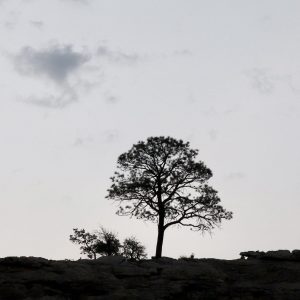
The tree stood lookout. It was no protector, no stern, armed guard challenging all comers. Friend or foe? It didn’t judge.
It just stood, tall and alone, on the sandstone bluff overlooking the campground. Standing still, silent, it spoke of change. It pointed out the nuances of sky and wind, interpreted their meaning anew with every shifting cloud. It heralded the present. It did not want you to miss any savor of shape or color, light or shadow, the passage of time, the hum of eternity behind it.

It never looked the same for ten minutes running. A different backdrop gave it new impact every time you saw it. Yet it never changed. It was only, always, ever, eloquently itself.

It is the feature of the landscape I remember more than any other. My fellow campers remarked on it with affection and even awe. It stood so tall in a place of salience, an exclamation point in a landscape of dots.
Because of this tree, I couldn’t take time for granted. It made the world too intriguing in the now. “This moment is new and will never come again,” it said. “Look. Look!”

What part of you stays the same, and what changes when your backdrop alters? When you stand in different lights? Who are you really?
And how does the word you speak in the world change in different contexts?

Living nomadically has made me wonder that anew, but the question of identity has plagued me for a while. We all have images of ourselves and who we are, but I have come to distrust identities that are contingent on circumstances—that can be taken from you when circumstances change. Health, ability, employment, relationships, geography, communities—all those things can change, most of them without our say-so.
We are also given identities without our say-so. Income, gender, physical ability, race, ethnicity, appearance, sexuality, and more all play a part in forming who the world thinks we are. What a productivity-driven culture thinks of me for being disabled, for example, for living nomadically, being middle-aged, or female, or single—relatively little of it jives with truth. But it is still hard not to fall for the distorted image reflected back to us, to separate ourselves from those partial truths to see clearly.

Maybe the quest for identity—who am I really?—is the wrong quest, an endeavor to root ourselves in sand, which cannot nourish or anchor us, rather than soil or stone. Maybe it is wiser to root ourselves in the depths of what we value. Not in the self-image of being people who value certain things, but in the values themselves. Being. Gratitude. Wholeness. The behaviors that grow from them.

Maybe the point is to find your place of salience. To be so deeply rooted there that you can stand tall and herald this moment’s truth as it shines around you. “Look!” you say.
Look.
